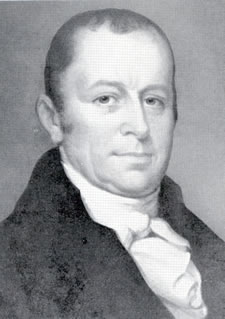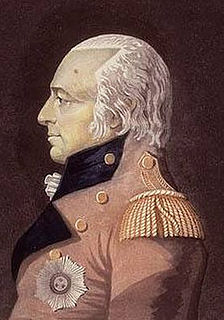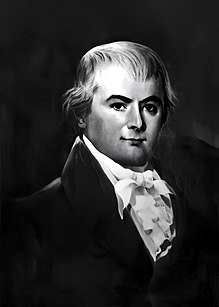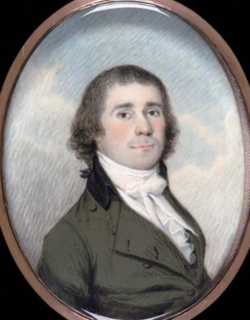Related Research Articles

The Territory of Louisiana or Louisiana Territory was an organized incorporated territory of the United States that existed from July 4, 1805, until June 4, 1812, when it was renamed the Missouri Territory. The territory was formed out of the District of Louisiana, which consisted of the portion of the Louisiana Purchase north of the 33rd parallel.

Simon Snyder was the third Governor of the Commonwealth of Pennsylvania, serving three terms from 1808 to 1817. He led the state through the War of 1812.

General Sir James Henry Craig KB was a British military officer and colonial administrator.
Nathaniel Pitcher was an American lawyer and politician who served as the eighth Governor of New York from February 11 to December 31, 1828.

Master Commandant William Henry Allen was an American naval officer during the War of 1812.

Gerard Lake, 1st Viscount Lake was a British general. He commanded British forces during the Irish Rebellion of 1798 and later served as Commander-in-Chief of the military in British India.
David Hall was an American lawyer and politician from Lewes, in Sussex County, Delaware. He was an officer in the Continental Army during the American Revolution, and member of the Democratic-Republican Party, who served as Governor of Delaware.

William Montgomery was a colonial-American patriot, pioneer, soldier, public servant, and abolitionist.

Benjamin Stephenson was the Congressional Delegate for the Illinois Territory from 1814 until 1817, and a delegate to the Constitutional Convention which enabled Illinois' statehood.
Frederick Conrad was a member of the U.S. House of Representatives from Pennsylvania.
Samuel Anderson was an American politician from Pennsylvania who served as an Adams Party member of the U.S. House of Representatives from Pennsylvania's 4th congressional district from 1827 to 1829. He served as a member of the Pennsylvania House of Representatives from 1815 to 1818 and again from 1823 to 1825.

Benjamin Parke was an American lawyer, politician, militia officer, businessman, treaty negotiator in the Indiana Territory who also served as a United States federal judge in Indiana after it attained statehood in 1816. Parke was the Indiana Territory's attorney general (1804–1808); a representative to the territory's first general assembly (1805); its first territorial delegate to the United States House of Representatives (1805–1808); one of the five Knox County delegates to the Indiana constitutional convention of 1816; and a territorial court judge (1808–1816). After Indiana attained statehood, Parke served as the first United States District Judge of the United States District Court for the District of Indiana (1817–1835).
Rees Hill was a U.S. army colonel in the War of 1812 and a politician who served as a Republican and Democratic-Republican member of the Pennsylvania House of Representatives for Greene County from 1810 to 1813 and from 1814 to 1820, including as Speaker of the Pennsylvania House of Representatives in 1816 and 1819. He also served as a Democratic member of the Pennsylvania State Senate for the 18th district from 1821 to 1822 and the 20th district from 1823 to 1824.
Jacob Holgate was a businessman, member of the Pennsylvania House of Representatives, and served as speaker of the House in 1815.
George Latimer was a Philadelphia merchant and member of the Pennsylvania House of Representatives. He served as speaker of the Pennsylvania House 1794–1798.

Thomas Humphrey Cushing was an officer in the Continental Army, and later the United States Army, and finally became a collector of customs for the port of New London, Connecticut.
The United States Senate elections of 1804 and 1805 were elections that expanded the Democratic-Republican Party's overwhelming control over the United States Senate. The Federalists went into the elections with such a small share of Senate seats that even if they had won every election, they would have still remained a minority caucus.
The 96th Regiment of Foot was the fourth light infantry regiment of the British Army to bear this name. It was originally created from the 2nd Battalion of the 52nd Regiment of Foot in 1803 at the start of the Napoleonic Wars. Initially a single battalion regiment, a second battalion was raised in 1804. The Regiment was based mainly in the Caribbean and on Jersey and renumbered as the 95th Regiment of Foot. Following the defeat of Napoleon, the British army was reduced in size, and the regiment was disbanded in 1818.

General Sir Charles Green, 1st Baronet was a British Army officer who became General Officer Commanding Northern District.
References
- 1 2 3 4 5 6 7 8 9 10 11 12 Futhey, J. Smith; Cope, Gilbert (1986), History of Chester County, Pennsylvania, with genealogical and biographical sketches, Heritage Books, pp. 676–677, ISBN 978-0-7884-4387-9
- 1 2 Lancaster Journal, p. 3, 1816-10-30Missing or empty
|title=(help) - ↑ "Take Notice", Aurora General Advertiser, p. 2, 1804-02-10
- ↑ Reporter, The (Brattleborough, VT), 10 (472), p. 1, 1812-05-23Missing or empty
|title=(help) - ↑ "Colonel Pearce", Poulson's American Daily Advertiser, p. 3, 1815-07-07
- ↑ "Appointments by the Governor of Pennsylvania", Poulson's American Daily Advertiser, p. 3, 1812-09-07
- ↑ "Appointments by the Governor", Berks and Schuylkill Journal, p. 2, 1818-11-14
- ↑ Democratic Press, p. 2, 1807-06-08Missing or empty
|title=(help) - ↑ "Chester County Meeting: September 20, 1803", Aurora General Advertiser, p. 2, 1803-09-22
- ↑ "Minutes of the Proceedings of the House of Representatives U.S.: January 8, 1805", Aurora General Advertiser, p. 2, 1805-01-17
- ↑ United States. Congress. House (1804), Journal of the House of Representatives of the United States: at the second session of the Eighth Congress, in the twenty-ninth year of the independence of the United States. November 5, 1804, to March 3, 1805., Samuel Harrison Smith, p. 247